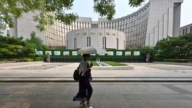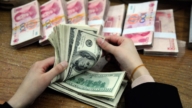【新唐人2013年07月10日訊】中國私募基金的一個特殊的現象是,掌控這些動輒數億美元資產的掌門人,往往都是出身所謂的「太子黨」們,而這些中共的高官後代,在中國如此不透明的專制威權體系裏,又缺乏民主社會中應有的合法性,那麼可以想像,他們對中國社會經濟的影響是令人擔憂的。
私募股權投資基金(Private Equity)是指投資於非上市股權,或者上市公司非公開交易股權的一種投資方式。由於私募股權投資的風險較大,信息披露不充分,所以往往採取非公開募集的形式。
根據「清科研究中心」統計,今年上半年共有70支可投資於中國大陸的私募股權投資基金完成募集,其中披露金額的64支基金,共募集62億多美元。
近幾年,中國的所謂紅二代——「太子黨」們,也前僕後繼的進入金融領域,建立了多項私募股權基金。
「博裕投資顧問」的合夥人之一江志成,是前中共黨魁江澤民的孫子。據了解,今年「博裕投資」計劃籌集15億美元投資資金。
前中紀委書記吳官正的兒子吳少華,目前的身份包括﹕中國光大(集團)總公司執行董事、副總經理、黨委委員,「光大金控資產管理公司」總裁、黨委書記等。
而「航天産業投資基金」成立於2010年1月。這家公司的總經理馬樂,是政治局委員、副總理馬凱的女兒,基金總規模50億元人民幣。
除此之外,中共元老李瑞環的兒子李振福,是「德福資本(GL Capital Group) 」的創辦人。
而前中共人大常委會委員吳邦國的女婿馮紹東(Wilson Feng),則是現任總資產達100億人民幣的國有產業投資基金——「中廣核產業投資基金」的總裁,他還身兼「上海百聯集團」董事。
中共政治局常委李長春的女兒李彤,是「中銀國際控股有限公司」的首席執行官,掌管著香港「中銀國際(Bank of China International) 」旗下的一傢俬募股權基金。
還有,前國務院副總理曾培炎的兒子曾之傑(Jeffrey Zeng),創立了一家隸屬於國有金融機構的基金——「開信創業投資管理有限公司」,是「國家開發銀行」與「中信資本」共同設立的創業投資管理公司。他擔任公司總經理兼管理合夥人。
而現任政治局常委劉雲山的兒子劉樂飛,曾擔任國企「中國人壽(China Life Insurance) 」的首席投資官,管理著1萬億元人民幣的資金。後來擔任「中信產業投資基金管理公司 (Citic Private Equity Funds Management) 」董事長、CEO,現任「中信證券」黨組書記、和副董事長。
在金融業發展的太子黨,還有控制著「上海聯和投資」的江澤民長子江綿恆;以及現任「中金」總裁兼首席執行官的朱雲來(Levin Zhu),朱雲來是朱鎔基之子,而朱鎔基的女兒朱燕來,則是「中國銀行」(香港)發展部的總經理。
美國南卡羅萊納大學艾肯商學院教授謝田:「(太子黨)不是光在金融界佔那麼大的比重,現在是全面的佔領,在政界,太子黨也是佔主要位置的,在軍界也是這樣的,軍界你要沒有太子黨的關係,你就不可能有師長級以上的位置。政治、經濟、軍事、金融還有大的企業,所有的全都佔了。」
根據《法國國際廣播電臺》報導,在目前中國權力難受制約的情況下,一些在金融行業發展的「太子黨」,享受更快的陞遷,更便捷的審批,更大的投資回報,甚至進行利益交換和輸送。
謝田:「所以基本上,他們怎麼運作,籌集了多少錢,賺了多少錢,怎麼樣逃稅、避稅,怎麼樣的轉移,根本是可以為所慾為,這實際上對中國老百姓來說,只能說是白白眼看他們的國營資產,被轉移到高幹子弟的手中。」
大陸企業觀察人士何軍樵:「我認為,(這對)中國的政治體制改革,甚至也包括經濟體制改革,實際上都起了一個很大的阻礙作用,因為他們這樣極易的結成一個牢不可破的利益集團。」
至於在中國對私募基金是否有監督機制?曾做過國企管理的何軍樵表示,在一個憲法都沒有辦法遵守的國家,中國的金融監督機制會起作用嗎?
採訪/田淨 編輯/黃億美 後製/郭敬
Private Equities of CCP Princelings
In China, private equity funds are special phenomenon.
These hundreds of billions of dollars of assets are controlled
by the so-called CCP (Chinese Communist Party) princelings.
However, in the opaque authoritarian system
in China, descendants of these CCP officials
lack the legitimacy of a democratic society.
Therefore, their socio-economic impact to China is worrying.
Private Equity refers to the unlisted equity or
non-publicly traded equity of a listed company.
As private equity is high risk, when there is
inadequate disclosure of information, it often
takes place in the form of non-public offering.
According to the Qingke Research Center,
a total of 70 private equities in China were
completed in the first half of this year.
64 private equities had the amount
disclosed, totaling 6.2 Billion U.S. dollars.
In recent years, China’s so-called princelings
have entered the financial sector successively.
They have established a
number of private equity funds.
Jiang Zhicheng, who is a partner of the Bo Yu
Investment Adviser, is the grandson of former
Chinese Communist Party (CCP) leader Jiang Zemin.
It has been learned that Bo Yu Investment planed
to raise US $ 1.5 Billion of investment funds in 2013.
Wu Shaohua, son of Wu Guanzheng, former secretary
of the Central Discipline Inspection, has various identities.
Wu is Executive Director and Vice President of China
Everbright (Group) Corporation, he is a CCP committee
member, president and CCP secretary of Everbright
Financial Holding Asset Management Company.
Aerospace Industry Investment Fund
was established in January 2010.
The company’s general manager
is Ma Yue, daughter of Ma Kai.
Ma Kai is a member of the Politburo,
and also vice general manager.
They hold a total fund size of 5 Billion Yuan.
In addition, Li Zhenfu, son of the CCP veteran
Li Ruihuan, is the founder of GL Capital Group.
Wilson Feng, son-in-law of Wu Bangguo, former
member of the CCP Standing Committee, is currently
the president of Guangdong Nuclear Investment.
This is a state-owned industrial investment
fund, with total assets of 10 Billion Yuan,
He is also Director of the Shanghai Brilliance Group.
Li Tong is the daughter of Li Changchun,
a member of Politburo Standing Committee.
She is a CEO of BOC International Holdings
Limited, and is in charge of a private equity fund
under Bank of China International in Hong Kong.
Jeffrey Zeng, is the son of Zeng Peiyan, former Vice Premier
and founder of Kaixin Investment Management Co., Ltd.
He has funds belonging to state-owned financial institutions,
a venture capital management company co-founded by
National Development Bank, as well as CITIC Capital.
He has served as general manager and managing partner.
Liu Lefei, is the son of Liu Yunshan, a current
Politburo Standing Committee member.
He once served as a chief investment officer of
state-owned enterprise China Life Insurance.
He managed 1 Trillion Yuan of funds.
He later served as Chairman and CEO for
Citic Private Equity Funds Management.
He is now is the CCP Secretary and
Vice Chairman of CITIC Securities.
Jiang Mianheng is the eldest son of Jiang Zemin.
He controlled Shanghai Alliance Investment.
Levin Zhu, is the son of Zhu Rongji, and
is now the president and CEO of CICC.
Zhu Rongji’s daughter Zhu Yanlai is General Manager of
Development Department (Hong Kong) of Bank of China.
Professor Xie Tian, School of Business
in University of South Carolina- Aiken:
“(Princelings) not only account for
a big proportion the financial sector.
They also have predominant
positions in politics and the military.
If you do not have a princeling relationship in the military,
you cannot have a position above division level commander.
Politics, economics, military, finances and large
enterprises, are all occupied (by princelings)”.
Radio France Internationale, highlighted the consequence
of lack of constraints on princelings power in China.
Princelings in the financial industry enjoy faster promotion,
more convenience in getting approvals, greater return
on investment, and even benefits exchange and transfers.
Xie Tian: “So basically, how they work, how much
money they raise and earn, how they avoid taxes,
how they transfer money, they can do whatever they want.
For Chinese people, they can only see state-owned
assets transferred to the hands of princelings”
He Junqiao, Enterprises Observer in China:
“I think it has been a large impediment to China’s
political reform, and even economic reform.
This is because they can so easily
form unbreakable interest groups.”
Are there oversight mechanisms
for private equity funds in China?
He Junqiao, who once worked in SOE management said
that in a country where even the constitution is unable
to be implemented, how could financial supervision work?




























